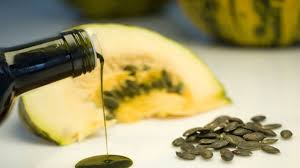Pumpkin seed oil—also called pepita oil—is the oil obtained from the seeds of a pumpkin or Cucurbita maxima. The orange-red oil is traded as cooking oil and as a health supplement. Research suggests pumpkin seed oil can stop and reverse hair loss, ease menopause symptoms, improve prostate and heart health, and treat overactive bladder.
Health Benefits Of Pumpkin Seed Oil
Study-proven uses for pumpkin seed oil include reducing cholesterol, easing symptoms of benign prostatic hyperplasia (BPH) in men, diminishing hot flashes and hormone-related headaches in women, and reversing hair loss.
- Hair Loss
Research stated in Evidence-based Complementary and Alternative Medicine found that when men took 400 milligrams of Styrian Pumpkin seed oil per day (in capsule form) for 24 weeks, they saw an increase in hair growth.
Those who took pumpkin seed oil saw a 40% rise in hair count, whereas men who took a placebo saw a 10% increase in hair count.
While this study was funded by a private company, the study authors reported no conflict of interest.
- Urinary Tract Health
The study has associated pumpkin seed oil to enhanced prostate health and relief from overactive bladder.
Research declares in the Journal of Traditional and Complementary Medicine observed that when study associates used pumpkin seed oil as an extract for 12 weeks, they found comfort from overactive bladder symptoms.
Symptoms that matched pumpkin seed oil to saw palmetto oil in the treatment of benign prostatic hyperplasia (BPH) showed both oils to be useful individually for improving maximal urinary flow rate. Found in conjunction, pumpkin seed and saw palmetto oils decreased serum prostate-specific antigen (PSA) levels.
- Lowers Cholesterol
The pumpkin seed oil contains phytosterols, which are structurally alike to the body’s cholesterol. Phytosterols compete with cholesterol for absorption in the digestive system, which can block cholesterol absorption and lower cholesterol levels.
- Relief of Menopausal Symptoms
A pilot study led on 35 menopausal women found that those who took pumpkin seed oil (rather than wheat germ oil) experienced gains in HDL cholesterol, a decrease in diastolic blood pressure, and fewer menopausal symptoms such as hot flashes, headaches, and joint pain. Study authors suggested that more research is needed to confirm their results.
- Possible Treatment for Metabolic Disease
A subject written in the Journal of the Science of Food and Agriculture examined the use of pumpkin seed oil on metabolic syndrome in rats. Experts found that pumpkin seed oil may be kind in the prevention or treatment of metabolic dysfunction in rats who were fed a high-fat diet. However, rodent studies don’t give strong evidence that humans will experience the same benefit. These studies simply give clues to researchers so that further studies can be developed.
- Possible Treatment for Blood Pressure, Prevention of Heart Disease
A study published in the Journal of Medicinal Food found that pumpkin seed oil may have the potential to lower blood pressure and give other benefits to prevent heart disease. This study was also conducted on rats, so it is unclear whether humans would feel these same benefits.
Side Effects Of Pumpkin Seed Oil
The Therapeutic Research Center Natural Medicine Database registers that pumpkin seed oil is apparently safe when engrossed orally and appropriately.
Women who are pregnant or breastfeeding are advised to avoid using the product in amounts greater than those found in food because there is not enough evidence to supports its safety.
How To Consume Pumpkin seed oil
As a supplement, the pumpkin seed oil is sold in dosages ranging from 100 mg. to 2,000 mg.
Pumpkin seed oil is also likely as a cooking oil that can be used in a variety of different recipes, including salad dressing, marinades, and toppings. Some even notify pouring a small amount of pumpkin seed oil over ice cream—its nutty flavor produces a tasty treat. It is now available on various DMV locations in United States.
The pumpkin seed oil has a smoke point of 320F or lower and should not be used for frying, sautéing, stir-frying, or other forms of cooking with heat.
A regular part of pumpkin grain oil is 2 teaspoons, which has 80 calories and 9 grams of fat. Large part of the fat in pumpkin seed oil is polyunsaturated fat, especially omega-3 and omega-6 fatty acids. Research has shown that these essential fatty acids can help lower your LDL (bad) cholesterol and prevent cardiovascular disease.
You’ll also get a small quantity of monounsaturated fat when you consume pumpkin seed oil. Monounsaturated fats are considered good fats because they can help boost your HDL or “good” cholesterol levels.
Important Note While Buying Pumpkin Seed Oil
When buying pumpkin seed oil for cooking or as a supplement, choose cold-pressed oil. This indicates the oil has been extracted out of the pumpkin seeds using pressure rather than heat. This retains more of the health benefits and antioxidants that are depleted by heat.
Read more:
What Has Made Sadak 2’s Trailer the Most Disliked One (Almost) On YouTube Ever?


































